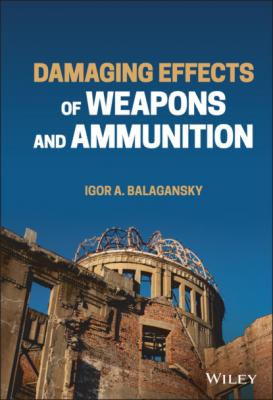Damaging Effects of Weapons and Ammunition. Igor A. Balagansky
Чтение книги онлайн.
Читать онлайн книгу Damaging Effects of Weapons and Ammunition - Igor A. Balagansky страница 17
 area depends on the concrete location of the centers of all damage zones. The total damaged area Sd does not equal the sum of the areas damaged by the individual shots, as the damage zones may overlap. Where there are overlaps, the increase in the destructive effect is usually neglected in target zones that are covered twice, three times, or more, and the damaged area Sd is taken to be the area covered by at least one damage zone. By dividing the damaged area of Sd by the target area of St, we obtain a portion of the damaged area.
area depends on the concrete location of the centers of all damage zones. The total damaged area Sd does not equal the sum of the areas damaged by the individual shots, as the damage zones may overlap. Where there are overlaps, the increase in the destructive effect is usually neglected in target zones that are covered twice, three times, or more, and the damaged area Sd is taken to be the area covered by at least one damage zone. By dividing the damaged area of Sd by the target area of St, we obtain a portion of the damaged area.
This random value characterizes the success of firing at an area target.
Figure I.10 The mutual position of the target area and its damaged zone.
Source: From Wentzel [2].
Thus, we are interested in the average fraction (expected value) of the damaged area M = M[U]. The methods of calculating of this value are different depending on whether one or more shots are fired at the target.
I.3.7.1 Fraction of Damage U with One Shot
Consider the area target T, on which a single shot is fired, with damage area L (Figure I.11). Let us condition all linear dimensions to express not in meters, but in probable deviations on corresponding axes. When it is necessary to express them in meters, we will mark it with a special symbol (m):
(I.32)
So, one shot is considered, in which the damage zone L is reset on target T so that the random point O1 (the epicenter of the explosion) is dispersed around the origin of coordinates O according to normal law. The probable deviations, chosen as units, are equal to one. It is necessary to find the average damaged fraction U.
Consider a random overlapping area Sd of the damage zone L with the target T (see the shaded area in Figure I.12) and the damaged fraction U:
(I.33)
Figure I.11 Mutual position and sizes of the target and the damage zone.
Source: From Wentzel [2].
Figure I.12 Random area overlapping the damage zone with the target.
Source: From Wentzel [2].
The value of U depends on the random position of the epicenter O1 . If point O1 lies far away from the target (Figure I.12a), the damaged fraction will be equal to zero. If point O1 lies as shown in Figure I.12b, then the damage zone and the target will overlap partially. Finally, if the damage zone lies as shown in Figure I.12c, the maximum possible area will be covered. In this case (when the damage zone is smaller than the target), this maximum fraction is equal to the ratio of the damage zone area to the target area:
Figure I.13 Complete coverage of the target area by a damage zone.
Source: From Wentzel [2].
There is another case when the damage zone is large and the target is small and all can be covered by the damage zone (Figure I.13). In this case,
One or another, at any ratio of damage zone and target size, there is some maximal value of umax of damaged fraction U.
A random value U is a so‐called mixed type value that has separate values with finite probabilities other than zero and intervals where the distribution function is continuous and only a certain probability density corresponds to each individual value. The distribution function (integral distribution law) for such random variables has breaks (jumps) in several points, and in the intervals between them grow continuously [4].
Remember that the integral law of distribution of the portion of the damaged area at one shot determines the probability of the occurrence that the portion of the damaged area U will be less than that specified by argument u.
Figure I.14 shows the form of the value distribution function U – a fraction of the damaged area at one shot. The extremes